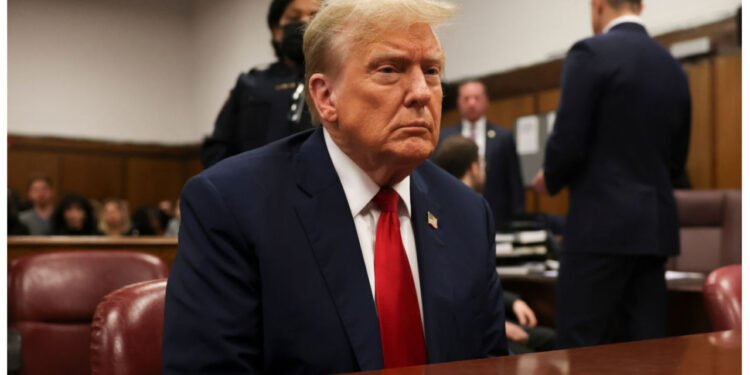The sordid facts of murky backroom deals poured out in open court Tuesday when former National Enquirer publisher David Pecker admitted that his magazine employed “checkbook journalism” to pay off sources with unflattering stories about Donald Trump.
The veteran executive acknowledged to a judge and jury that his duty was to “catch and kill” negative press about Trump, including rumors of affairs and children born out of wedlock.
Pecker’s testimony, as the Manhattan district attorney’s lead witness, bolstered the state’s theory that Trump and his allies attempted to influence the outcome of the 2016 election by burying bad news about Trump while elevating wild claims embarrassing to his political opponents.
The 34 felony counts of falsifying business records that Trump faces in connection with one of the hush money payments. He has pleaded not guilty to the accusations.
And there’s more to come. Pecker is likely to testify again on Thursday, when the trial resumes.
Pecker opened his evidence on Tuesday by recounting his relationship with Trump, which began in the late 1980s when they were first introduced at Mar-a-Lago, which he described as the start of their “great, mutually beneficial relationship.”.
Before acquiring the National Enquirer, Pecker pitched a magazine named “Trump Style” to the then-New York business billionaire, a pitch that Trump allegedly appreciated and turned into a reality. From there, Trump would alert Pecker to developments on his show, “The Apprentice,” which Pecker’s magazine readers “religiously” followed.
Their connection evolved when Trump started his first presidential campaign in 2015. Pecker began to visit Trump “more frequently,” and the two began speaking on the phone every couple weeks.
The tabloid publisher’s interactions with Trump’s then-personal attorney and fixer, Michael Cohen, also grew significantly, from “once a month or twice a quarter” to “at least once a week.”
“And if there was an issue, it could be daily,” Pecker said.
A watershed event occurred in August 2015, two months after Trump launched his candidacy, when Cohen called Pecker and informed him that “the boss”—a word he used for Trump—wwanted to meet. Pecker met with Trump and Cohen at Trump Tower, where they asked him how he could “help the campaign,” he explained.
Pecker offered to print both positive and negative stories about Trump and his 2016 presidential opponents. He also pledged to function as the campaign’s “eyes and ears.”
The agreement was “mutual benefit,” he stated.
The arrangement was not in writing—”It was just an agreement among friends,” Pecker explained—bbut it went into action quickly. He instructed his staff at American Media Inc., where he was CEO and published the National Enquirer, to keep the acquisition a secret.
“[I was] going to try to help the campaign, and to do that, I want to keep this as quiet as possible,” Pecker said in a statement.
During the campaign, the National Enquirer published a number of ugly and unsubstantiated articles about Trump’s opponents. Their headlines ranged from an alleged photo of Sen. Ted Cruz’s (R-Texas) father with President Kennedy’s assassin to a supposed “love child” of Sen. Marco Rubio (R-Florida).
Cohen purposefully planted many of the pieces, making dubious claims about Trump’s political opponents based on their debate performance. Pecker stated that his tips will serve as the foundation for the Enquirer’s articles.
The tabloid publisher also prevented anti-Trump stories from being public.
Pecker testified that because Trump was seeking public office and “well-known as the most eligible bachelor,” he anticipated that women from Trump’s past would try to sell their stories to publications.
However, a Trump staffer submitted the first piece he killed for the campaign.
After a source alerted the Enquirer that Trump Tower doorman Dino Sajudin claimed Trump fathered an illegitimate kid with another building employee, Pecker said he “immediately” contacted Cohen, who stated he would look into it.
Even after confirming that Sajudin’s allegation was fake, the Enquirer chose to pay $30,000 for the rights to his story to ensure that other media outlets were not tipped off—a significantly greater fee than provided for the ordinary article, Pecker explained.
“So this was a way to lock it up?” The prosecutor, Joshua Steinglass, inquired.
“Yes,” Pecker said, adding that even though the story was incorrect, it would have been “very embarrassing to the campaign” if it had spread.
When Pecker agreed to buy the story, Cohen informed him that “the boss” would be “very pleased.”
Pecker once attempted to release the doorman from his exclusive agreement, but Cohen quickly shut it down.
“He asked, ‘When?’ I said, ‘Now,'” Pecker said. “He said, ‘No, release him after the election.'”
When Pecker testifies again, he will most certainly describe two more catch-and-kills involving former Playboy model Karen McDougal and porn star Stormy Daniels. Both Stormy Daniels and Karen McDougal claimed they had affairs with Trump, a claim he has denied, and both received payments to keep quiet.
After Pecker completes his direct examination, Trump’s attorneys will use cross-examination to poke holes in his testimony and undermine any evidence that supports the prosecution’s case.










